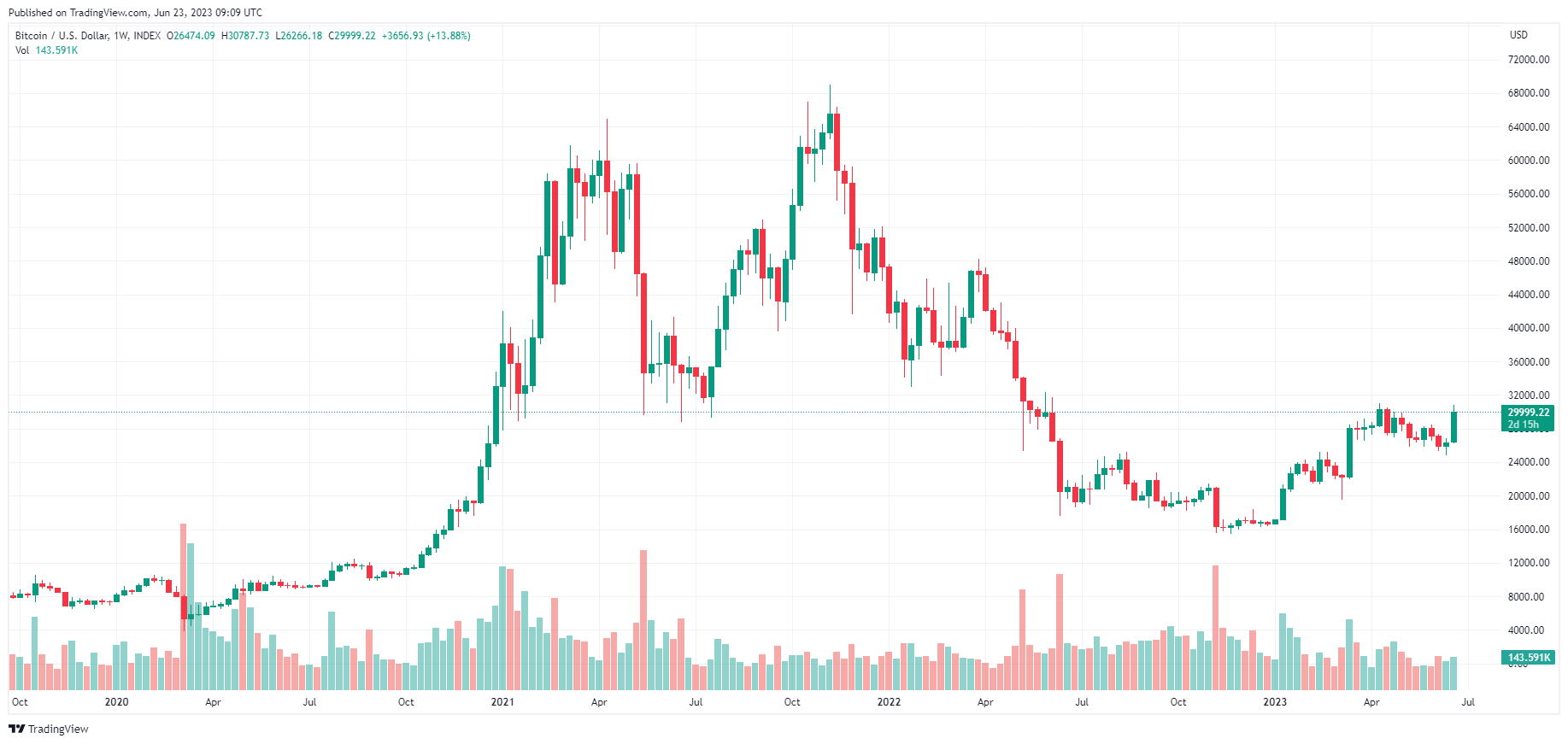Following weeks of harsh measures by US regulators, financial heavyweights such as BlackRock, Fidelity, Deutsche Bank, Citadel Securities, and more have made announcements in the past few days. This surprising turn of events led to a rapid recovery of the Bitcoin price, bringing it back to historical resistance levels.
2023 has been a tough year for US-based crypto service providers. The tone among US regulatory authorities became more stringent early in the year, shortly after the FTX/Alameda collapse. This resulted in numerous lawsuits against regulated US entities and unofficial guidelines that revealed an evidently hostile environment for crypto service providers in the US. However, just one week after the SEC's most significant crackdown to date, consecutive announcements from some of the most influential giants in the traditional financial world surprised the industry. This move by "TradFi" companies drove the Bitcoin price up by 30,000 USD, reaching historical resistance levels and restoring optimism that had been crushed by the negative regulatory environment.
"Operation Choke Point 2.0" causes unease
With the Securities and Exchange Commission (SEC) at the forefront, US authorities drastically tightened regulations for US-based crypto service providers in the first half of the year. The Federal Reserve, the Federal Deposit Insurance Corporation (FDIC), and the Office of the Comptroller of the Currency (OCC) issued a joint statement warning domestic banks about the risks associated with crypto offerings. The Federal Reserve Board rejected long-standing applications from various crypto banks to join the Federal Reserve System and further restricted their activities. Additionally, the National Economic Council of the US President strongly advised banks against continuing to interact with crypto firms.
During one week in March, the crypto industry lost all three of its largest financial institutions that accepted companies in the digital assets sector as clients. Silvergate succumbed to the consequences of the FTX debacle, and the Silicon Valley Bank (SVB) had to cease operations due to a classic asset-liability mismatch. Signature Bank, the last of the three significant crypto-friendly banks, was closed by the FDIC, despite being solvent. To this day, a detailed explanation for the regulatory closure of Signature Bank has not been provided. The FDIC merely cited a loss of trust by the regulator in the bank's management. For some industry representatives, this series of events raised suspicions and drew comparisons to "Operation Choke Point".
Key service providers such as crypto exchanges and stablecoin providers immediately lost their bridges to the traditional financial world, but the US authorities' crackdown was not yet over. Further risk warnings from the US Department of the Treasury and a highly critical statement from the White House exacerbated the situation. Then, two weeks ago, the SEC made its biggest move to date. The regulator filed lawsuits against the globally leading crypto exchange Binance, classified the US trading platform Coinbase, and deemed over twelve of the largest cryptocurrencies by market capitalization as unregistered securities. The pressure on the prices of Bitcoin and especially the altcoins was overwhelming. Within a week, Polygon (MATIC) and Solana (SOL), for example, lost 40% of their value.
Surprising turn of events among financial giants
The regulators' harsh actions against crypto firms did not seem to worry traditional financial institutions; on the contrary. Just a day after the SEC filed lawsuits against Binance and Coinbase, Soros Fund Management CEO Dawn Fitzpatrick stated that the industry was now "ripe for acquisition by established financial companies." Other financial giants appear to see a similar opportunity.
Last week, the world's leading asset manager, BlackRock, filed an application for the first spot Bitcoin ETF, and shortly after, WisdomTree, Invesco, and Valkyrie followed suit. Additionally, Deutsche Bank, the largest bank in Germany by total assets, recently applied for regulatory approval to operate a custody service for crypto assets. A day later, EDX Markets launched—a crypto exchange supported by Wall Street giants such as Charles Schwab, Citadel Securities, and Fidelity. Lastly, even Fed Chairman Jerome Powell stated during a congressional hearing that cryptocurrencies do have future prospects. Consequently, the pessimism in the markets vanished immediately. Two weeks of negative price developments were wiped out within a few days, and Bitcoin once again stands at the historical resistance level of 30,000 USD.









